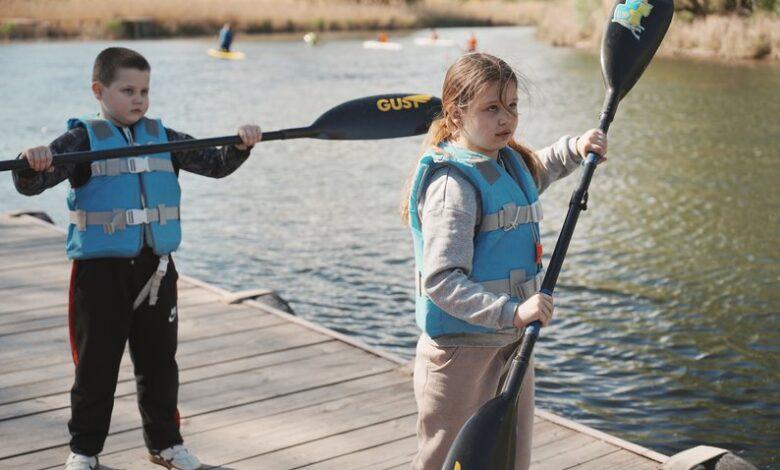Rowing base in Kharkiv region: children’s classes organized, but safety issues left aside

During the war, children need not only protection and care, but also conditions for leisure, development, sports, and socialization. Being in constant anxiety, isolation, and limitations affects mental health, physical activity, motivation to study, and participation in community life. In such circumstances, the organization of safe leisure time for children becomes especially important as an element of care, stabilization and gradual return to the usual rhythm of life. However, when it comes to regions close to the front line, the main question arises: is it possible to combine activism and security? And what is behind the initiatives that restore the sports infrastructure where there were flights until recently?
This is exactly the situation in Kharkiv Oblast. In the village of Donets in the Balakli region, located on the banks of the Siversky Dinets, a rowing base is being restored. This object, familiar to many since Soviet times, remained neglected for a long time. As told head of the culture, youth and sports department of the village council, Serhiy Kundenko, a new stage in the life of the rowing base began already during the war – after it was possible to find a new coach. It was then, according to him, that the base got a new lease of life and began to revive. Back in 2021, the boathouse was repaired there, and over the next three years, the windows were gradually replaced, the roof was covered, the facade was insulated, and the facility was completely switched to autonomous heating. Today, as Kundenko emphasized, 20 children are engaged in rowing at the base — this is one and a half times more than before the start of the full-scale invasion.
At the beginning of the war, the front line was only 15 kilometers away, the nearby areas were hit by “Hradi”, the situation was critical. However, after the stabilization of certain parts of the territory, the community decided to return to initiatives. According to village head Anatoly Nazdrachov, up to 15 million hryvnias have already been allocated from the local budget for the restoration of the base. The work is ongoing – it is planned to be completed by the end of 2025. In parallel with the renovation, classes gradually began: already 20 children are engaged in the base – one and a half times more than before the war. The boat ramp was repaired, the windows and roof were replaced, the facade was insulated, and autonomous heating was installed.
The initiators of the project are inspired by the result: training takes place regularly (with the exception of air alarms), children participate in competitions, in particular at the international level. Coach Oleksiy Pivovarov says that his students have already gone to France for competitions. Parents are satisfied with the fact that children are distracted from their phones, learn discipline, move, and become part of the sports community. Classes are free.
10-year-old Maya Kulbachna started rowing a few months ago after being inspired by a video on social media. Her nine-year-old brother Ivan trains with her. He honestly admits: he tried football and boxing, but rowing became something that immediately worked out – and it kept him. The child’s impression is simple, but telling: in other sports it didn’t work, but here – a feeling of success from the first day.
Rowing veterans also train at the base. One of them is Oleksandr Ivashchenko, who has almost half a century of experience. He has dozens of medals in his collection. He is convinced that children should be shown by their own example that sport is not only a technique, but also a way of thinking. Today, the training base is a place where older athletes pass on motivation and skills to younger ones, even in conditions where the war continues dozens of kilometers away.
Village head Nazdrachev says: security risks have not disappeared. Dozens of Shaheds may fly by overnight, alarms may sound, but the community believes that it is now necessary to invest in such projects. In his opinion, delaying until “after the victory” means losing a generation. That is why Dinka not only restores the rowing section, but also plans to create rehabilitation programs for veterans. The plans include simulators, water classes, and physical rehabilitation of soldiers who have returned from the front. The sports base should become a place of return to public life.
In addition to rowing, the village has boxing, women’s boxing, football, swimming, and volleyball sections. All this is under the roof of the same base, which is planned to be completed by the end of next year. The initiators emphasize: this is a long-term project. It is not only about the development of sports, but also about preserving health, the structure of everyday life, and social connections.
It should be noted that in the public communication of the initiators, no detailed position regarding safety standards was voiced. How exactly is the safety of children organized? What is the algorithm of actions during an air alert? Do the coaches have instructions for evacuating children? What risks were assessed before allowing training on water 15 kilometers from an active combat zone? There are no answers to these questions yet.
Therefore, the main problem is not the idea itself – it is logical, valuable, but is it timely? Children practicing at a rowing base need not only a coach, motivation and a boat, but also a safe space. And if the community, the authorities, the sports community took responsibility, then this responsibility should include not only discipline and enthusiasm, but also an action plan in case of a threat. Otherwise, the sports base risks becoming not only a symbol of courage, but also of safety.





